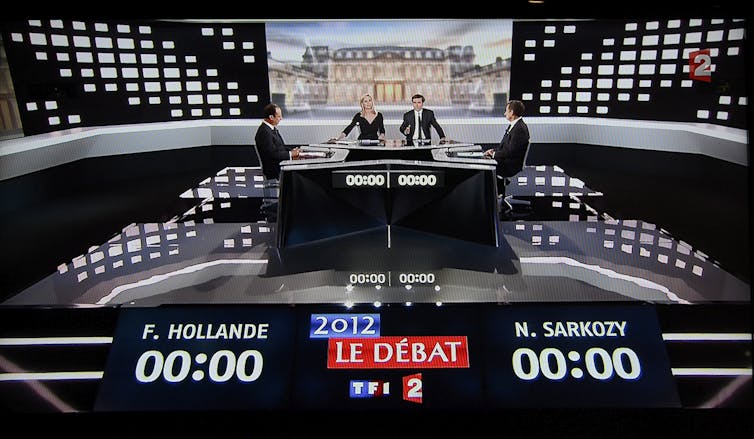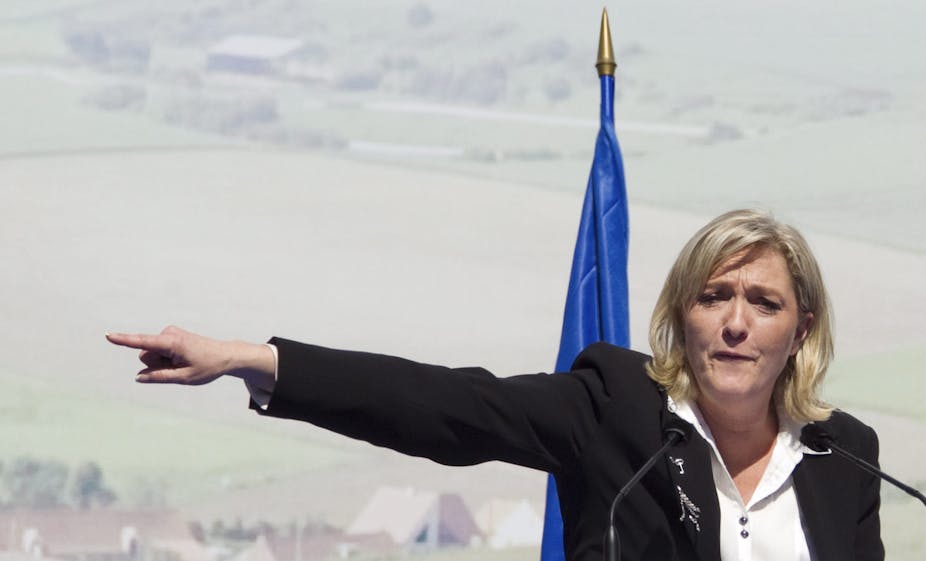Marine Le Pen’s ability to attract nearly a fifth of the vote in the first round of the French presidential election was a resounding victory for her party.
While Le Pen’s Front National (FN) did not secure enough of the vote - 17.9% - to make the final run off, there is no doubt the FN voting bloc will be influential in deciding whether Nicolas Sarkozy retains office or Socialist candidate Francois Hollande becomes the 5th Republic’s first left President since Francois Mitterand.
The message is clear: parties of the “far right” are now an established political force in mainstream European politics.
Inaccurate terminology
The success of the Front National hasn’t gone unnoticed in the popular media. In news coverage the FN and other members of the Nativist Populist (NP) party family are most often referred to as “far-right”. In the economic sense at least, the accuracy of the “far-right” descriptor is doubtful.
In the contemporary Anglosphere, “right” tends to refer to economic liberalism, free markets, corporatism and globalism. Taken to its logical conclusion, far-right economics would be radically libertarian laissez-faire capitalism in which the nation, in ethnic, cultural and structural terms, is rapidly moving towards its expiry date.
In an age when “right” has come to mean, less state and more markets and corporations, the economic policies offered by the NP parties are often further to the “left” than many of those offered by centrist social democrats.
Anti-globalisation
Le Pen’s own public utterances criticising “ultra liberalism” and mondialism (One Worldism) are evidence enough that her natural constituency is not the Davos set. Rather, she is distinctly protectionist in her economic positions, having described globalisation as “getting slaves to make things abroad to sell to unemployed people here”.
The NP parties tend to campaign on a cultural and a social axis. The cultural axis is traditionalist, the economic axis tends to be something best described as ethno-communitarianism with distinctly statist and leftist positions. These two axes make strategic sense when considering the FN’s targeted demographic.
French voters who support the Front National feel assailed on two fronts. First by cheap Chinese and other foreign imports local manufacturers cannot compete against, lest they start a “race to the bottom”. Second, they fear mass non-European immigration, mainly from Islamic Africa and Asia. They perceive themselves to be overwhelmed by free markets and open borders. The NP parties portray a situation where globalising elites make all the gains while the average citizen loses job security, identity and quality of life.

NP economics are nativist in the sense they’re designed to protect the national interest against foreign capitalists in the age of globalisation, while simultaneously supporting intra-national homogeneity by restricting welfare.
Welfare for all, as long as they are us
This anti-globalist, and “welfare chauvinist” approach to economics is increasingly evident in the platform of the Dansk Folkeparti (Danish People’s Party – DF), which has moved its economic policies approach from one of neo-liberalism, leftwards to a position that could be described as social democratic, in order to broaden its electoral appeal to working class ethnic Danes.
The nativists transcend the traditional right-left dichotomy of party politics by supporting the welfare state (albeit restricted to natives), while developing economic policies designed to protect native business, workers and culture from the perceived excesses of global free trade and Islamism.
The economics of the NPs are defensive. They support welfare and state led solutions to economic problems, and often support renationalisation of key state assets. Kent Ekeroth, spokesperson for the Sweden Democrats described his party as a mixture of traditional Scandinavian social democracy and nationalism. Le Pen’s calls for the renationalisation of energy, transport, health and education put on the to the left of the French Socialist Party on such issues.
So when you see a party described as “far right” in the media, there’s every chance their economic policies are more statist than the centre Left, though your sure to find their immigration and law and order policies way diametrically opposed to the to those same “soft” left parties.
Beyond the left/right dichotomy
Dutch political scientist Cas Mudde has developed the most considered and precise understanding of the NP party family, concluding their defining features are nativism, populism and authoritarianism.
Considering the economic positions of the party family in Europe, the “far right” descriptor is inaccurate. In the current context such parties would be better referred as nationalist, ethno-communitarian, or populist to better express their positions which are a combination of what is a combination of traditionalist patriotic, conservatism and statist, protectionist, mixed economics.
Marine Le Pen’s refusal to back either Sarkozy or Hollande in the election run off is an indication that the NP parties aims to transcend the extant bipolar political axis - FN supporters chanted at their own May Day Rally “neither left nor right” and “this is our home, our country”.
For the FN it’s not a struggle between left and right, but between nationalism and internationalism in its left, right, corporate and Islamic guises.

